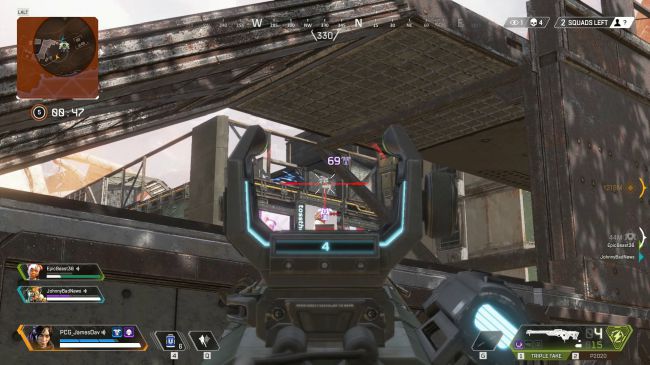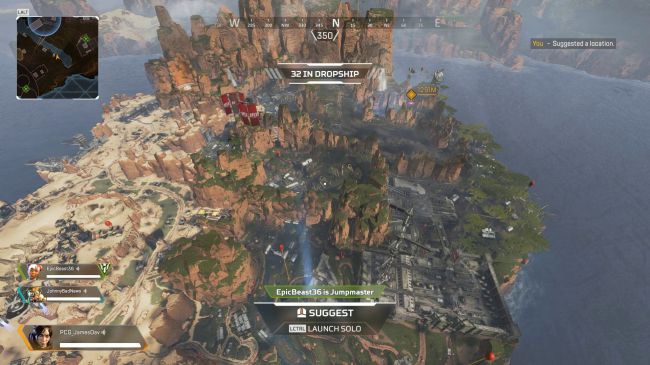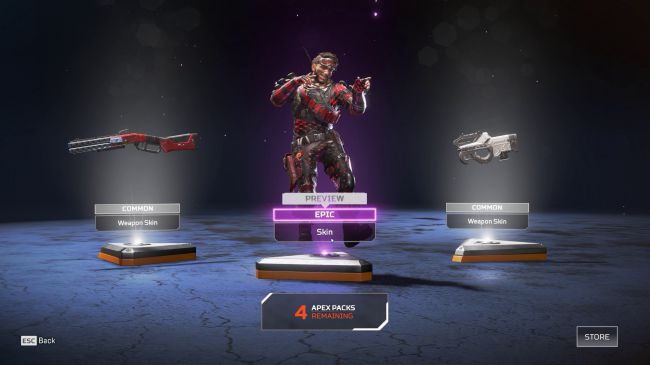Apex Legends is a quiet revolution in how we communicate in games, and an excellent team-based battle royale I can recommend to anyone, caveat-free.
Need to know
You may also be interested in: Iron Man VR Version Full Game Setup Free Download
What is it: F2P battle royale FPS set in the Titanfall universe.
Expect to pay: Free-to-play, optional cosmetic microtransactions
Developer: Respawn Entertainment
Publisher: EA
Reviewed: on Intel i9-9900k, GeForce 980 Ti, 16GB RAM
Multiplayer: 3-player squads, 60 players total
We press H to pay respects now. My good friend JohnnyBadNews, who I’ve never met, just let me know they found a level-three scope for my Longbow DMR. The selflessness: They found it in a dead player’s inventory, noted that I was using a Longbow, and let me know it was there—all without saying a word. I pick it up and a prompt appears on my screen: “Press H to thank JohnnyBadNews.” My index passes over the grenade key and hits that H with the firm yet gentle assurance of a hug. I think we all know what the H stands for.
I shouldn’t be feeling this nice. Apex Legends is a lot like most battle royale games. You drop from the sky onto an island, sweep the floor for weapons and gear, and scramble to stay inside a series of ever-shrinking circles pressing 60 people towards inevitable conflict. But Apex Legends is also the product of the genre’s failures so far, a patient and refined response that makes for the most accessible, uncompromising battle royale experience yet.
Drawing of the three
Apex Legends is set in the Titanfall universe, but plays nothing like it: every gun has ballistics, the titans are gone, and so is wall-running. The guns feel as responsive and peppy as they have since Modern Warfare, and taking distance and drop into account in the same split-second formerly used just to aim makes me feel like a mathematical savant when shots connect. I’m partial to the Wingman, a hand cannon with a slow reload and magnum stopping power that makes it feel like a cowboy’s Single Action Army.
Almost every gun has a unique personality. The lever-action Peacekeeper shotgun fires individual pellets in a star-shaped pattern, while the faster EVA-8 Auto spits out a 3×3 square. The Triple Take is another highlight, a sniper rifle that throws a horizontal spread of three shots with every trigger pull, easing the pressure of landing those long-range tracking shots.

The main thing is there’s something for everyone: semi-auto rifles, auto rifles, LMGs, and SMGs. Weapon stats are improved by finding and equipping attachments scattered all over the map, which is where I thought Apex would lose me. Inventory management is still the worst part of the battle royale. I hate sorting through PUBG’s perplexing assortment of scopes and stocks, but Apex auto-equips anything better than what I already have on a compatible weapon. You can dig around and swap some attachments between weapons, or opt for a lesser scope if you prefer it, but I love that I can let Apex run on autopilot and choose what’s best for me.
If everything sounds familiar so far, that’s because Apex doesn’t deviate much from the PUBG formula. It’s Respawn’s particular interpretations of those ideas that make Apex feel so special. Besides the diverse roster of characters with unique abilities, communication is probably the best example of this. The lack of a solos mode (although a recent leak indicated it’s on the way) at launch is intentional. Apex is a shooter that encourages kinship between squadmates, whether it’s concentrating fire on a single target, coordinating abilities, or donating the Devotion LMG you just found to a friend in need.
Enter the ‘ping’ system, an ingenious, object-sensitive tool used to draw attention to locations, items, enemies, and objects that might be of interest to your squadmates. I don’t want to go back to Fortnite or PUBG or any game unless the entire industry agrees to implement something like it in all multiplayer games forever and ever, amen. It’s that simple and invigorating.
You’ll use it most often to mark where you’re headed, but if the reticle is over an enemy, the marker will turn into a red crosshair and your character will note they’ve spotted someone. Ping an open door and they’ll remark someone’s probably been there. Ping a scope in a dead player’s inventory like JohnnyBadNews, and the reticle won’t just display the color and icon of the item, but the character will call out that specific scope. Your character will spit out a different voice line if you ping an opened loot container than if you ping a closed one, and all eight characters have lines for every item and weapon. You can even ping pings to acknowledge them. If you ping a pinged ping—well, may God have mercy on your soul.
Pinging’s darkest magick is its ability to make playing with strangers as worthwhile as playing with friends. My first few wins came from playing with calm, quiet enigmas who coordinated movement, called out enemy locations, and shared loot without speaking or typing anything at all. This itself is a boon to accessibility and a salve to toxicity, but atop it, Apex features a text-to-speech comms option for players with difficulty speaking or worried about harassment, which unfortunately feels like a revolutionary act when huge multiplayer games like Anthem and Fallout 76 release without text chat at all.
To go from being routinely debased by legions of preteen racists in Fortnite to notching wins with strangers in utter silence in Apex Legends is a videogame miracle.
Another turn ’round the fun
Typically the most anxiety-inducing part of learning a new battle royale game, the drop gives one squadmate control while the other two hang on until they’re ready to let go, which might be never. And that’s OK, because every squad leaves behind a colored contrail, making it simple to see which way the competitive wind is blowing. Calling out where other teams are landing is more important to surviving the ensuing gauntlet than where you land. Just don’t tell your Jumpmaster. Respawn, please let us press H to quell their feelings of inadequacy.
Once you land, moving through Apex’s island is a constant joy, a playground of jutting cliffs and gigantic skeletons and clusters of buildings. It recalls the smaller, crowded arenas of the original Modern Warfare and the once incalculable expanse of Halo’s Blood Gulch in the same minute. Terrain moves from craggy cliffsides and settles into deep valleys with sparse cover, with biomes from murky swamp villages to sun-scorched Mad Max deathmatch arenas. No single area is a visual masterpiece, but its diversity helps you orient yourself as you migrate between regions. As compact as the map is, it feels massive, even if it’s not a challenge to cross when you can zip up one of a dozen or so balloons tethered to the ground for another quick dive towards the next circle.

Where to?
Sliding is a more reliable way to get around. Hit crouch on a downward slope and you’ll glide like a toboggan. Apex shows its skill ceiling and playfulness with this mechanic: Every short staircase provides a hit of free speed, but sliding is also equally important as a defensive posture, a way to change your body profile and evade while under fire. Friendship ended with wall-running. Now crouch-slide is my friend.
And I’m always sliding somewhere. Those balloons are all over, supply drops appear suddenly on the map, and clusters of buildings and loot chests break up the scenery. With enough distractions, I’ve yet to move through the map in the same way. Apex avoids Fortnite’s Tilted Tower crowding problem by marking a random hot loot spot each match and sending a supply ship with even more goodies floating across the map. As a result, everyone tends to disperse in unpredictable directions, and the meta for Apex’s map feels pleasantly uncertain. A terse sniper fight between buildings in Skull Town might be interrupted by a sneaky shotgun crew, or an ambush below the northern waterfall might get counter-ambushed from a squad soaring in via balloon from above.
Fights aren’t always fast and aggressive—some abilities slow them down and allow for retreats and regroups, offering a bit of breathing room before the next showdown. If things get too hot, Wraith can go invisible for a few seconds and retreat. Pathfinder can create a zipline that spans the whole arenas. Gibraltar can pop a dome shield to protect a chokepoint or give the team a second to react when caught in the open.
But most characters have blindspots that feedback into team communication. When Wraith pops into the void, enemies disappear completely from her field of vision. A few pings from a friend can help. Caustic gains ‘threat vision’ on enemies moving through his gas clouds, a good cue to ping away. Not all abilities areas immediately effective though. Gibraltar can force an entire squad from cover with a mortar strike, while Mirage’s ultimate just turns you invisible and spawns a bunch of decoys that stand around doing a very good decoy impression. It’s easy to see through.
This isn’t Overwatch—the abilities add flavor and characterization, but are rarely game-winners on their own. Every character has the same health and movement speed. The emphasis is still on precision aiming and smart maneuvering, with a little help from abilities that relieve or induce pressure.
For those raised on the time-to-kill of Call of Duty and the Titanfall games, Apex’s health pools might feel a little too big. If someone is wearing level-three armor, they’ll absorb multiple, full shotgun blasts, or maybe an entire SMG magazine. This is intentional.
Because the most satisfying kills act against classic FPS instincts. Slowly chipping away at an enemy squad’s health from afar so they use up their healing items is a valid strategy. Using your downed teammate as an actual shield—Apex makes this ‘knockdown shield’ an actual item you can activate when you’re down but not out, giving you a more active role in this near-death phase. I’ve seen clips of players filling a small room with tons of loot only to trap a curious squad inside by blocking the doorways with Caustic’s gas traps. It was a horrific, creative ploy that I wish I’d thought of. Weapons are only as effective as wits in Apex, and deeper health pools ask the player to think of what else they can do to gain an advantage besides shooting.
The elasticity stretches to death, too, a novelty for battle royale. Pick up any eliminated teammate’s banner and you can revive them at any respawn station. These stations are rarely located anywhere safe or convenient, but the lengths to which I’ve had total strangers go to revive me never fail to inspire. I’ve been carried by a demigod, respawned three times in a single match for a second-place spot I didn’t deserve. Hell, the first match I won was on the back of my squadmates getting wiped. They stuck around, cheering me on in-text chat while I ran out of the first circle and into the fire just to bring them back. Struggling to keep your team in the game can be as satisfying as confidently gunning for first place.
A few issues trip up the momentum. Straddling the cartoonish look of Borderlands and the dryer futuristic military aesthetic of the Titanfall series makes it hard to tell Apex Legends apart from a lineup of FPSes. If it weren’t for the impressive roster of women and people of color within the initial batch of legends, then Apex wouldn’t stand out at all. A ranked mode would be nice, partly because teammates who leave mid-match aren’t penalized.

Performance gave me more struggles than I expected on my hardware. Apex rewards quick reflexes, making smooth mouse aim at 100-plus fps the goal. But to clear 90 fps with my 980 Ti, I need to play at 1920×1080 on low settings on a 2560×1440 monitor, rendering the island in slightly blurred swatches of brown and green. It’s far from the technical nightmare the early days of PUBG were—just know you might be due for an upgrade if you want it to look nice without sacrificing a competitive edge.
Apex Legends feels like a trick. It’s a free-to-play battle royale game announced and released on the same day with no early access phase, very little downtime, and cosmetic microtransactions that don’t feel predatory—drop chances are listed on the same page you buy loot boxes. Queue times are the fastest in the genre, the guns are the result of over a decade of refinement across multiple studios, and every character has a role to play in a close-knit team. Apex is stable, spilling over with smart design touches, and it’s set a new industry standard with an impressive breadth of accessibility options and communication tools.
After a couple years of seeing battle royale games release in unfinished states, Respawn’s confident spin on gaming’s most popular trend has completely reinvigorated my enthusiasm for the genre. It’ll need consistent support and long term updates to stay exciting, but Apex Legends is one hell of an opening salvo. Free, friendly, and consistently fun, it’s the best battle royale game available today.
Among Trees PC Download Free FULL Crack Version
If you are facing any issue in downloading or need assistance Click here .

















